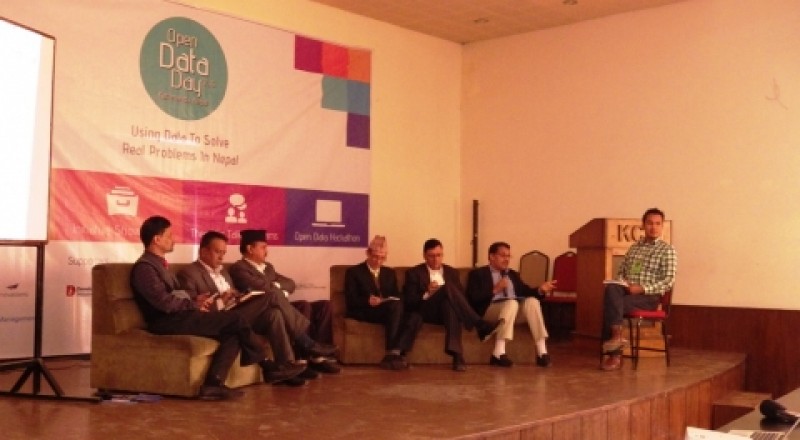Open Data Day 2016 in Nepal was celebrated today on March 5 with a successful event organized by Open Nepal and Young Innovations Private Limited with the support of various government, non-government stakeholders and technology and open data enthusiasts.
Open Data Day is celebrated globally on March 5 with the purpose of advocate on liberalization of data – promoting better accessibility and transparency of governance through increased demand and supply of open data.
Inauguration and Opening Remarks
The event kick started with opening remarks by Pavitra Rana, Open Nepal coordinator where she emphasized on the need to realize how open data could be generated and utilized to solve the existing problems. Likewise, Bibhusan Bista, Chief Executive Officer (CEO) of Young Innovations Private Limited (YIPL) highlighted how the current practice of managing and publishing data in inaccessible formats such as PDF files needs to be changed. He highlighted that the current open data enthusiasts need to advocate on the accessibility and openness of data as he felt that the “crowd has the power to change the scenario”. He opined that talks, discussions and discourses on open data is not just limited to technology enthusiasts but a wide spectrum of stakeholders from data generators (researchers) to policy makers.
Following his opening remark, a policy dialogue was organized which was a panel discussion on how open data mainstreamed into solve burning issues in Nepali context. The panel discussion involved Chief Commissioner of National Information Commission, Director General of Central Bureau of Statistics, Secretary of National Reconstruction Authority, among other guests.
Krishna Hari Banskota, Chief Commissioner of National Information Commission pointed out the relevance of open data to promote and implement transparency and accountability and sustainability of national programmes prioritizing achievement of Sustainable Development Goals 2016-2030.
Some of his suggestions to take forward the Open Data Movement in Nepal included:
- Holding debates and discussions on open data all over the country to answer three key questions: What, Why, How of Open Data in Nepal
- Documenting best practices of open data utilization in Nepal
- Conducting Baseline Survey on Open Government Data in Nepal
- Conducting a Prevalence Survey on current demands for open data in Nepal
Thematic Talk Programme
Panel Discussion was followed by Thematic Talk Programme on various issues such as aid data management, media monitoring, open street mapping and data visualization.
HERD’s Presentation
HERD’s Presentation on Media Monitoring of Nepal Earthquake: Sudeep Uprety, Senior Officer – Research Uptake and Communications at HERD gave an overview of a media monitoring project that was conducted immediately after the earthquake. He shared his experience of how various issues related to public health care, rescue efforts, aid management, management of food, drugs and supplies, government efforts, public reactions, sanitation, economic impact and positives from Nepal Earthquake. Sudeep highlighted the outcome of this project in terms of generating quick, comprehensive, neutral and accessible data and thereby resulting in quick and informed response and contributing to better learning and better preparation for government stakeholders in handling such emergency response situations.
The presentation can be downloaded from this link.
Initiative Showcasing during Stall Show
HERD also had a stall during the event where HERD’s initiative of real time data management using technology and research uptake activities were highlighted. During the stall, research uptake and communications materials – special series and newsletters were distributed to the participants.

Data as the New Oil
Sudeep, during his presentation also stressed on how data has become the NEW OIL and thereby the open data movement needs to generate more demand for open data and creating a resource platform as a good practice contributing to development through evidence informed decision making, which is the core strategy of HERD as a research and development oriented organization.



Comments(0)
No comments found.